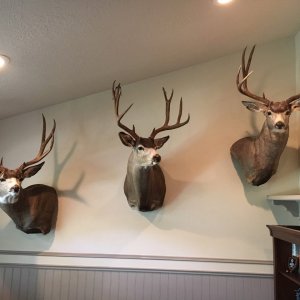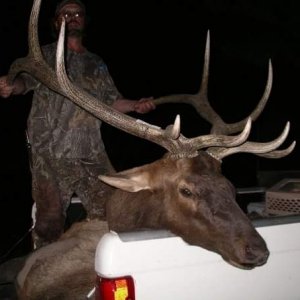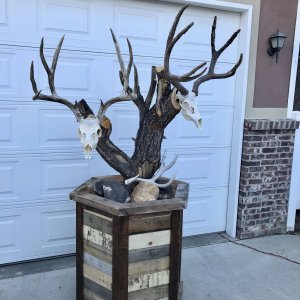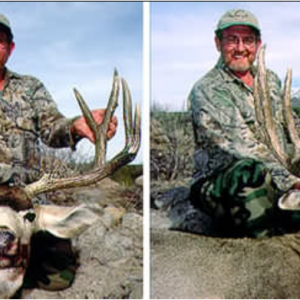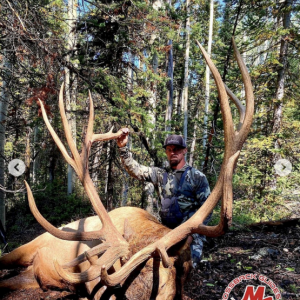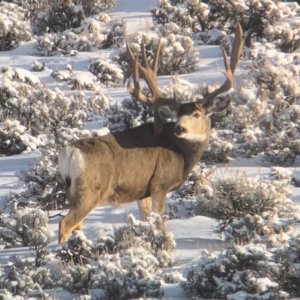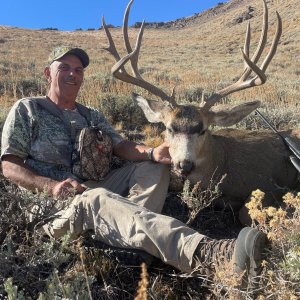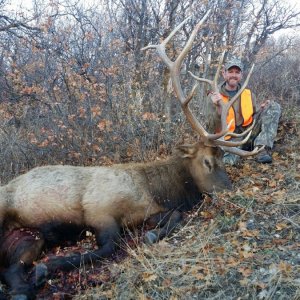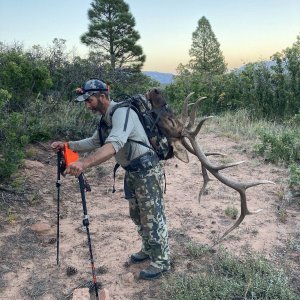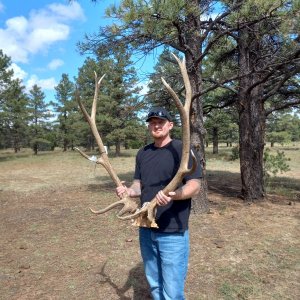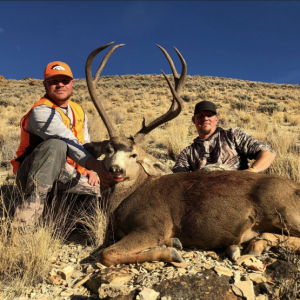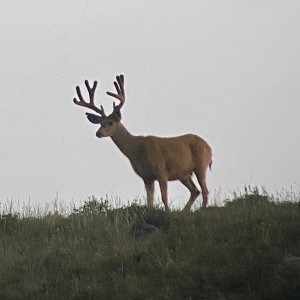BeanMan
Long Time Member
- Messages
- 6,903
Here you go Graybeard:
By Charlie Meyers
Denver Post Outdoors Editor
Call it the Big Squeeze.
If certain Colorado landowners - and perhaps a few wildlife managers - have their way, public hunters will find their opportunities for prized licenses severely reduced. And very soon.
An initiative speeding toward the 2005 Colorado General Assembly would effectively double the number of licenses awarded to landowners under an expansion of a preference system first introduced in 1973.
Landowner preference, always a hot issue in a state characterized by vast expanses of government land and a legacy of public ownership of wildlife, just got shoved up to the front burner.
The bottom line: greatly diminished access to prized bull elk, buck deer and buck antelope for anyone who doesn't pay the increasingly large fees for a privately controlled tag. If taken to its ultimate progression, such a trend takes Colorado hunting increasingly toward the European model of privatization of game.
Perhaps the most amazing aspect of this process is discussions have been ongoing between the Colorado Division of Wildlife and landowner groups without the vast majority of the hunting public even knowing about it - almost as if the those who stand to lose the most from this process don't count.
Legislation passed in 1973 awarded landowners 15 percent of all limited big-game licenses, those issued through a special computer drawing process. This allotment comes off the top, before any public application is considered.
By law, these tags can be transferred, which generally means to the highest bidder. Some landowners conduct business directly with hunter/clients, mostly nonresidents; others peddle the permits to an outfitter, who serves as a middle man in the equation, sharing profits with the rancher.
Either way, these preferred licenses yield big bucks to the landowner, an arrangement many believe necessary to maintain a delicate balance between effective wildlife management and encroaching development.
"It's a critical issue where landowners are feeding these animals or providing winter refuge," said Rick Kahn, DOW's big-game manager and coordinator of the current dialogue. The concern, Kahn said, is that unless ranchers gain revenue from hunting to help crack their financial nut, they'll be forced to sell out to subdividers or wealthy out-of-staters who'll exclude hunters altogether.
The rub, Kahn said, is over percentages. At the October meeting of the Colorado Wildlife Commission, a delegation that included representatives of the Farm Bureau and Colorado Cattleman's Association made a formal petition for an increase, reflecting earlier talks with DOW officials.
Suggested percentages range from 30 to 35 on the eastern plains, where the private property mix is roughly 98 percent, to 25 to 30 in the mountains, where public lands often dominate.
There's also a push for an add-on "family license," available to immediate family members and, perhaps, restricted to private land.
This move becomes even more significant against the backdrop of an ongoing commission thrust to boost the elk areas regulated for limited licenses. Instead of allowing over-the-counter bull licenses, up to 30 percent of management units might be designated for draw licenses, with the landowner allotment again coming straight off the top.
Landowner preference currently is more of an issue for deer, which are universally limited, and on the several "quality" elk units managed for bigger bulls under a restricted draw. If limited elk units increase significantly along with a big boost in landowner preference, public hunting opportunity will suffer.
While it's reasonable to suggest that landowners - particularly those who offer essential sustenance to game animals - deserve an increase in compensation, this recent drive ignores one consequential fact. Landowner revenues have grown steadily and dramatically with an escalation of fees charged for these transferable tags. A license in a prime elk unit is worth several times more than it was 30 years ago.
At this point, the initiative is being fast-tracked through a process that requires first the approval of DOW director Bruce McCloskey, then Department of Natural Resources executive director Russell George and, presumably, Gov. Bill Owens. Kahn said the agency hopes to have some form of draft legislation ready within 30 days, in plenty of time to get the wrinkles ironed out for the upcoming legislative session.
Up to now, not much has been heard from various sportsman's groups, or the hunting public at large. Certainly this issue will serve as an important litmus test of the public's ability to muster enough political clout to influence a vital decision against what might be termed powerful private interests.
Another concern is that, failing to get satisfactory concessions from the wildlife agency, the landowner coalition will take its drive to a sympathetic legislature, as it did in 1973.
One inescapable conclusion from all this is that a state wildlife agency that always has operated in mortal fear of the legislature cares more about the welfare of landowners than the rights of the hunting public - not to mention the basic principles of game management.
Farmers and ranchers don't exercise as much influence in Colorado politics as they did three decades ago. There aren't as many as there once were, but they ride together and kick up a lot of dust.
Where that dust settles, the result will say much about the future of public hunting in Colorado as well as the entire concept of public ownership of game.
Listen to Charlie Meyers at 9 a.m. each Saturday on "The Fan Outdoors," KKFN 950 AM. He can be reached at 303-820-1609 or [email protected].
By Charlie Meyers
Denver Post Outdoors Editor
Call it the Big Squeeze.
If certain Colorado landowners - and perhaps a few wildlife managers - have their way, public hunters will find their opportunities for prized licenses severely reduced. And very soon.
An initiative speeding toward the 2005 Colorado General Assembly would effectively double the number of licenses awarded to landowners under an expansion of a preference system first introduced in 1973.
Landowner preference, always a hot issue in a state characterized by vast expanses of government land and a legacy of public ownership of wildlife, just got shoved up to the front burner.
The bottom line: greatly diminished access to prized bull elk, buck deer and buck antelope for anyone who doesn't pay the increasingly large fees for a privately controlled tag. If taken to its ultimate progression, such a trend takes Colorado hunting increasingly toward the European model of privatization of game.
Perhaps the most amazing aspect of this process is discussions have been ongoing between the Colorado Division of Wildlife and landowner groups without the vast majority of the hunting public even knowing about it - almost as if the those who stand to lose the most from this process don't count.
Legislation passed in 1973 awarded landowners 15 percent of all limited big-game licenses, those issued through a special computer drawing process. This allotment comes off the top, before any public application is considered.
By law, these tags can be transferred, which generally means to the highest bidder. Some landowners conduct business directly with hunter/clients, mostly nonresidents; others peddle the permits to an outfitter, who serves as a middle man in the equation, sharing profits with the rancher.
Either way, these preferred licenses yield big bucks to the landowner, an arrangement many believe necessary to maintain a delicate balance between effective wildlife management and encroaching development.
"It's a critical issue where landowners are feeding these animals or providing winter refuge," said Rick Kahn, DOW's big-game manager and coordinator of the current dialogue. The concern, Kahn said, is that unless ranchers gain revenue from hunting to help crack their financial nut, they'll be forced to sell out to subdividers or wealthy out-of-staters who'll exclude hunters altogether.
The rub, Kahn said, is over percentages. At the October meeting of the Colorado Wildlife Commission, a delegation that included representatives of the Farm Bureau and Colorado Cattleman's Association made a formal petition for an increase, reflecting earlier talks with DOW officials.
Suggested percentages range from 30 to 35 on the eastern plains, where the private property mix is roughly 98 percent, to 25 to 30 in the mountains, where public lands often dominate.
There's also a push for an add-on "family license," available to immediate family members and, perhaps, restricted to private land.
This move becomes even more significant against the backdrop of an ongoing commission thrust to boost the elk areas regulated for limited licenses. Instead of allowing over-the-counter bull licenses, up to 30 percent of management units might be designated for draw licenses, with the landowner allotment again coming straight off the top.
Landowner preference currently is more of an issue for deer, which are universally limited, and on the several "quality" elk units managed for bigger bulls under a restricted draw. If limited elk units increase significantly along with a big boost in landowner preference, public hunting opportunity will suffer.
While it's reasonable to suggest that landowners - particularly those who offer essential sustenance to game animals - deserve an increase in compensation, this recent drive ignores one consequential fact. Landowner revenues have grown steadily and dramatically with an escalation of fees charged for these transferable tags. A license in a prime elk unit is worth several times more than it was 30 years ago.
At this point, the initiative is being fast-tracked through a process that requires first the approval of DOW director Bruce McCloskey, then Department of Natural Resources executive director Russell George and, presumably, Gov. Bill Owens. Kahn said the agency hopes to have some form of draft legislation ready within 30 days, in plenty of time to get the wrinkles ironed out for the upcoming legislative session.
Up to now, not much has been heard from various sportsman's groups, or the hunting public at large. Certainly this issue will serve as an important litmus test of the public's ability to muster enough political clout to influence a vital decision against what might be termed powerful private interests.
Another concern is that, failing to get satisfactory concessions from the wildlife agency, the landowner coalition will take its drive to a sympathetic legislature, as it did in 1973.
One inescapable conclusion from all this is that a state wildlife agency that always has operated in mortal fear of the legislature cares more about the welfare of landowners than the rights of the hunting public - not to mention the basic principles of game management.
Farmers and ranchers don't exercise as much influence in Colorado politics as they did three decades ago. There aren't as many as there once were, but they ride together and kick up a lot of dust.
Where that dust settles, the result will say much about the future of public hunting in Colorado as well as the entire concept of public ownership of game.
Listen to Charlie Meyers at 9 a.m. each Saturday on "The Fan Outdoors," KKFN 950 AM. He can be reached at 303-820-1609 or [email protected].

